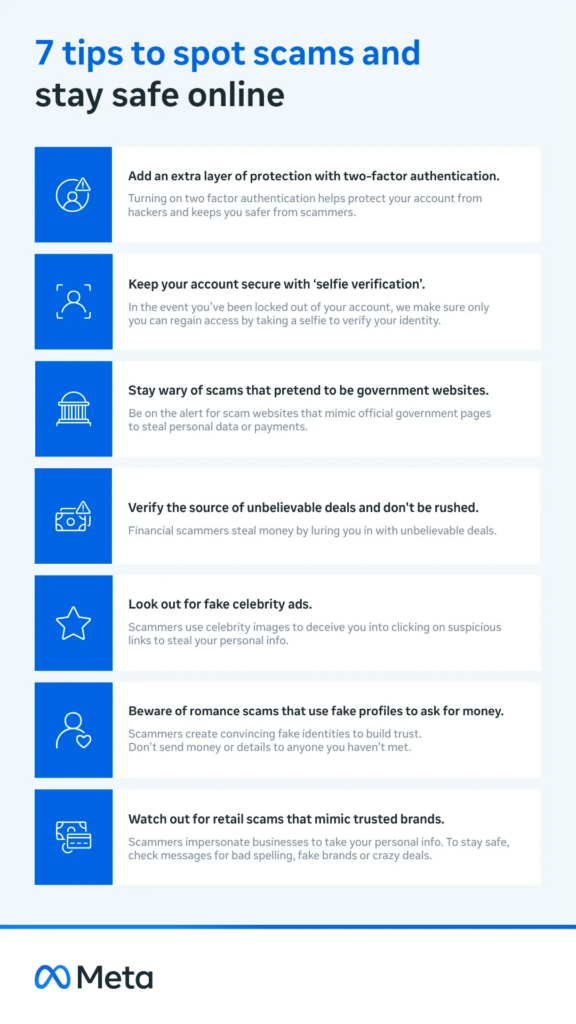Here’s the latest with Meta– The tech company has reportedly banned over two million accounts on Facebook, Instagram, and Whatsapp. This massive removal of accounts is linked to Meta’s fight against large-scale organised crime, especially the ‘pig butchering’ scam.
In a recent report, Meta revealed that this year itself, it has taken down approximately two million accounts linked to scam centres in Southeast Asia and the Middle East.
What is ‘pig butchering’?
Well, according to Meta, pig butchering is “one of the most egregious and sophisticated fraud scams”. Essentially, the victim of a pig butchering scam is lured into making continuous monetary contributions, typically in the form of cryptocurrency. According to the U.S. Institute of Peace, $64 billion is stolen annually through such scams.
The pig butchering scam first emerged in China in 2016. It then proliferated to Southeast Asia and gained prominence during the height of the Covid-19 pandemic. While the scam centres are based in Asia, they target individuals globally. They tend to target individuals with fake job-listings, companionships, or investment opportunities.

Here’s how it works– the scammer builds trust with the victim through online communication, by means of dating apps, social media, and messaging. The scammer then convinces the victim to ‘invest’ in something under completely false pretenses. The scammers make up deceptive personas, often pretending to be attractive single people, government agencies or businesses.
Through a ‘spray and pray’ strategy, they cast a wide net online in the hopes that a couple of unsuspecting individuals will respond. Once they do, the scammers then undertake a more tailored approach to build trust and convince their targets to invest incremental amounts into various scammer-controlled accounts and websites.
Top five signs you’re being targeted
Here are the most common signs you’re being targeted towards for a pig butchering scam.
- A dating app match starts “love bombing” you. This is when a new online relationship moves quickly and becomes very personal early on. However, the scammer never wants to meet up and only communicated via text throughout the day.
- You receive a text asking you to download a crypto trading or investment app with the claim that once you do, you’ll make tons of money. The scammer might even go to the extent of showing you how the app works.

- You receive a quick, small return on your investment. The platform might permit small withdrawals of your investment amount at first, but the minute you try to withdraw more, you’ll realise you’re no longer permitted to do so.
- You’re told you have pending bills to pay. Sometimes, you’ll receive a text message or call informing you that you owe an organisation or business some money that has to be paid off immediately.
- You receive a ‘wrong number’ text or call. These are designed to lower your guard and lure you into a conversation.
Meta’s crackdown on pig butchering scams
To combat the rise of pig butchering scams, Meta’s approach entails:
- First, through the Dangerous Organisations and Individuals (DOI) Policy, identified criminal organisations are completely banned from Meta platforms and are further subjected to a wide-range of enforcement tools.
- Second, through new on-platform enforcements, Meta has refined its detection of behavioural and technical signals to scale detection of such scams.
- Third, Meta is well aware that scammers constantly evolve their tactics to evade detection, So, Meta will now be collaborating with both law enforcement and industry peers to further crackdown on such scams.
- Last but not least, Meta has introduced new tech features that protect its users from suspicious interactions. To illustrate, a warning will appear for users on Messenger and Instagram DMs, reminding users to be aware of suspicious interactions. Likewise, on Whatsapp, if you’re added to a group chat by someone unknown, you’ll be shown a ‘context card’ that’ll give more details about who is behind the outreach.
Meta’s online safety tips
Meta has also published a series of best practices for users to stay safe online.

